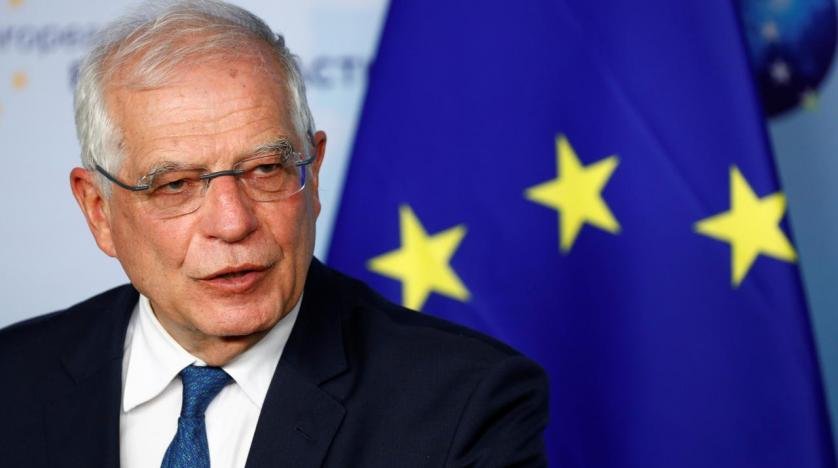Normalisation of EU-Turkey relations will remain extremely challenging in the absence of a solution to the Cyprus issue, EU High Representative Josep Borrell said in his report on Ankara’s relations with the bloc, which will be discussed on Monday at the Foreign Affairs Council (FAC).
Foreign Minister Nikos Christodoulides is in Brussels for the FAC, where he was to discuss with his EU counterparts EU-Turkey relations based on Borrell’s report but also developments in the eastern Mediterranean.
According to the Cyprus News Agency, the report notes that Turkey’s non-recognition of the Republic of Cyprus continues to lead to the blockage of different paths of cooperation while normalisation of EU-Turkey relations will remain extremely challenging in the absence of a solution to the Cyprus issue.
Borrell stated that “the Cyprus settlement issue is a core element of Turkey’s strong disagreements with the EU in the Eastern Mediterranean.” He added that during 2020 hope for progress on the Cyprus settlement process had to be put on hold until after the elections of the Turkish Cypriot community. “The electoral context led to an increase in polarising rhetoric and provocations, prompting strong reaction from the EU as reflected in Council and European Council conclusions.”
New Turkish Cypriot leader Ersin Tatar rejects the agreed solution framework of a bizonal bicommunal federation and, along with Turkey, has called for an alternative solution, that of two states on the island.
The report also said that Borrell expresses full support for the UN secretary-general’s (UNSG) efforts for the speedy resumption of the Cyprus settlement talks despite the unilateral actions in the fenced area of Varosha as well as repetitive statements directly questioning the agreed basis for the solution to the Cyprus problem as provided by the relevant UN Security Council resolutions.
“Talks between the two communities, eventually leading to an agreement, are essential for decreasing tensions in the Eastern Mediterranean,” Borrell said, adding that positive outcomes related to practical and vital issues for the Turkish Cypriot community – such as facilitation of export of haloumi/hellim and distribution of Covid-19 vaccines – could lead to an environment conducive to more trust.
Overall, Borrell said, the political context in EU-Turkey relations has progressively deteriorated over the past years, bringing to a virtual halt the various instruments and processes for bilateral engagement and cooperation.
“This has been mostly due to Turkish actions in the Eastern Mediterranean, directly challenging the rights of the Republic of Cyprus in its maritime zones, and a sharp increase in Turkey’s provocative actions against Greece; the failure to advance in the Cyprus settlement process, coupled with Turkey’s related threatening actions and disparaging rhetoric; and assertive Turkish interventions in most of the surrounding regional conflicts, in ways that often were at odds with broader EU interests.”
To deepen the present momentum and incentivise closer EU-Turkey ties across the board, he added, “we believe that the Union should put a number of possible areas of cooperation on the table to allow for a progressive, proportionate and reversible approach.”
The so-called ‘positive agenda’ suggested by Borrell includes strengthening economic ties which he said, was “another win-win situation for both sides”, modernisation and expansion of the scope of the current EU-Turkey Customs Union including a guiding framework for economic reforms in Turkey. “EU Member States should agree on the negotiating directives and authorise the Commission to open negotiations for this modernisation, provided that Turkey takes concrete steps in resolving the current trade irritants,” the report said.
He also suggests that previously suspended high-level dialogues could be relaunched on the economy, energy, transport, political developments, foreign and security policies, and initiated on other new topics, such as the green deal/climate, internal security, inter-faith relations and culture.
On the migration issue, Borrell called for a more effective and mutually beneficial implementation of key areas of the 2016 EU-Turkey Statement, notably on migration management. “This would mean in particular that Turkey would without any further delay restart the process of returns from the Greek islands, starting with the 1,450 returnees whose legal appeals are exhausted.”
Conversely, EU Member States should step up resettlements from Turkey to the Union, building on the progress made so far. He added that, in line with the December 2020 European Council conclusions, the Commission will also rapidly prepare options for continued funding for refugees and host communities in Turkey. “Given the serious needs on the ground and the significant burden that Turkey continues to shoulder in this regard, this is a European investment in stability and solidarity.”
The report also suggests progressive restrictive measures in the event of Turkey’s return to the policy of tensions, ranging from additional listings of entities and individuals to restrictions on the economy and tourism services, the energy sector and technology export bans.







Click here to change your cookie preferences